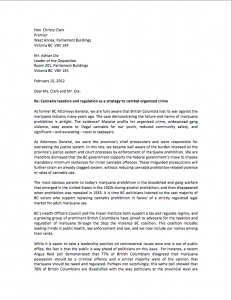 February 29, 2012 Virgin Group founder Richard Branson; former Presidents of Brazil, Colombia and Switzerland; and former Federal Supreme Court Justice Louise Arbour called Bill C-10 a ‘grave mistake’ and publicly endorsed Stop the Violence BC.
February 29, 2012 Virgin Group founder Richard Branson; former Presidents of Brazil, Colombia and Switzerland; and former Federal Supreme Court Justice Louise Arbour called Bill C-10 a ‘grave mistake’ and publicly endorsed Stop the Violence BC.
Please see below for complete media listing.
Print and Online
Demande de marche arriere (12/02/29). Journal de Montreal
Tran, N. (12/02/29). The war on pot is ‘destructive’ and ‘ineffective’ says panel Examiner
Press, J. (12/02/29). Richard Branson urges Tories to change crime bill and legalize pot, Ottawa Citizen
Press, J. (12/02/29). Richard Branson urges Tories to change crime bill and legalize pot, Vancouver Sun.
Press, J. (12/02/29). Richard Branson urges Tories to change crime bill and legalize pot, The Provincs
Press, J. (12/02/29). Richard Branson urges Tories to change crime bill and legalize pot, Edmonton Journal
Press, J. (12/02/29). Richard Branson urges Tories to change crime bill and legalize pot, Windsor Star
Press, J. (12/02/29). Richard Branson urges Tories to change crime bill and legalize pot, Victoria Times Colonist
Press, J. (12/02/29). Richard Branson urges Tories to change crime bill and legalize pot, Calgary Herald
Cheadle, B. (12/02/29). Reconsider pot prohibition, international panel urges Harper, The Star Phoenix Cheadle, B. (12/02/29). Reconsider pot prohibition, international panel urges Harper, The Chronicle Herald
Cheadle, B. (12/02/29). Reconsider pot prohibition, international panel urges Harper, MSN News Canada
Cheadle, B. (12/02/29). Reconsider pot prohibition, international panel urges Harper, The Daily News.
Cheadle, B. (12/02/29). Reconsider pot prohibition, international panel urges Harper, The Daily Courier
Cheadle, B. (12/02/29). Reconsider pot prohibition, international panel urges Harper, Brandon Sun
Cheadle, B. (12/02/29). Reconsider pot prohibition, international panel urges Harper, Hamilton Spectator
Cheadle, B. (12/02/29). Reconsider pot prohibition, international panel urges Harper, Winnipeg Free Press.
Cheadle, B. (12/02/29). Reconsider pot prohibition, international panel urges Harper, Toronto Star
Cheadle, B. (12/02/29). Reconsider pot prohibition, international panel urges Harper, Global News
Cheadle, B. (12/02/29). Reconsider pot prohibition, international panel urges Harper, CTV.CA.
Cheadle, B. (12/02/29). Reconsider pot prohibition, international panel urges Harper, Huffington Post
Cheadle, B. (12/02/29). Reconsider pot prohibition, international panel urges Harper, Metro News Montreal
Cheadle, B. (12/02/29). Reconsider pot prohibition, international panel urges Harper, Metro News Toronto
Cheadle, B. (12/02/29). Reconsider pot prohibition, international panel urges Harper, Globe and Mail
Kieltyka, M. (12/03/01). Luminaries lambast C-10’s approach to pot, Metro News Halifax
Kieltyka, M. (12/03/01). Luminaries lambast C-10’s approach to pot, Metro News Ottawa
Kieltyka, M. (12/03/01). Luminaries lambast C-10’s approach to pot, Metro News London
Kieltyka, M. (12/03/01). Luminaries lambast C-10’s approach to pot, Metro News Edmonton
Kieltyka, M. (12/03/01). Luminaries lambast C-10’s approach to pot, Metro News Calgary
Kieltyka, M. (12/03/01). Luminaries lambast C-10’s approach to pot, Metro News Vancouver
Mulgrew, I. (12/03/02). Cal to legalize pot goes beyond wanting a puff, The Vancouver Sun.
Canada News: Stephen Harper repeating same old mistakes with tougher pot laws, global group says (12/02/29). Toronto Star
Payne, E. (12/02/29). Plenty of blame for the drug crisis, Ottawa Citizen.
Alter crime bill: world thinkers. (12/02/29). The Windsor Star.
Press, J. (12/02/29). Richard Branson urges Tories to change crime bill and legalize pot, Montreal Gazette.
Press, J. (12/02/29). Richard Branson urges Tories to change crime bill and legalize pot, Canada.com.
‘Building more prisons ony deepens the drug problems’. (12/02/29). iPolitics.
Cheadle, B. (12/02/29). International panel urges Harper to reconsider Canadian pot problems, Winnipeg Free Press.
MacPherson, D. (12/02/29). The Global Commission on Drug Policy salutes Stop the Violence BC and sends message to the Senate Canadian Drug Policy Coalition
Press, J. (12/02/29). Kofi Annan and Sir Richard Branson urge Tories to change crime bill, Canada.com.
Easton, M. (11/11/17). Why is it only ‘formers’ who want to talk about drugs?, BBC.
Radio
CBC Radio One – National
Newstalk 980 CJME – Regina
680 News – Toronto
AM 770 – Calgary
AM 900 CHML – Hamilton
iNews 880 – Edmonton
News 95.7 – Halifax
News 88.9 – Saint John
News 91.1 – Moncton
News 88.9 – Saint John
Newstalk 610 CKTB – St. Catherines
Newstalk 800 CJAD – Montreal
AM 770 – Calgary
600 CKAT – North Bay
CFAX 1070 – Victoria
News 1130 – Vancouver
CFRA 580 – Ottawa
600 CKAT – North Bay
570 News – Kitchener
AM 980 – London
630 CHED – Edmonton
660 News – Calgary
CKNW 980 – Vancouver
Radio NL – Kamloops
(12/02/29). CTV News St John
(12/02/29). CHCH Hamilton –News Now
(12/02/29). CTV News National
(12/02/29). CBC News Now National
(12/02/29). CKNW Vancouver.
(12/02/29). 660 News Calgary.
(12/02/29). 630 CHED Edmonton.
(12/02/29). AM 980 London.
(12/02/29). CFRA 580 Ottawa.
(12/02/29). News 1130 Vancouver.
(12/02/29). 570 News Kitchner
(12/02/29). CFAX 1070 Victoria.
(12/02/29). 600 CKAT North Bay.
(12/02/29). A770 Calgary
(12/02/29). Newstalk 800 CJAD Montreal.
(12/02/29). Newstalk 610 CkTB St Catherines.
News 91.1 Moncton.
(12/02/29). News 88.9 St John.
(12/02/29). News 95.7 Halifax.
(12/02/29). iNews880 Edmonton.
(12/02/29). AM 900 CHML Hamilton.
(12/02/29). AM770 Calgary
News. (12/02/29). 680 Toronto.
CJME. (12/02/29). Newstalk 980.
National. (12/02/29). CBC.
Tremonti, A. M. (12/02/29). The Current, CBC.
Television
Fitzpatrick, M. (12/03/12). Tories’ crime bill clears Parliament, CBC News.
Fitzpatrick, M. (12/03/07). Crime bill vote pushed back to Monday, CBC.
End ‘destructive’ war on pot, panel urges Harper. (12/02/29). CBC News.

 For more on the November 2011 announcement of support from four former BC Attorneys General, please see the links below.
For more on the November 2011 announcement of support from four former BC Attorneys General, please see the links below.